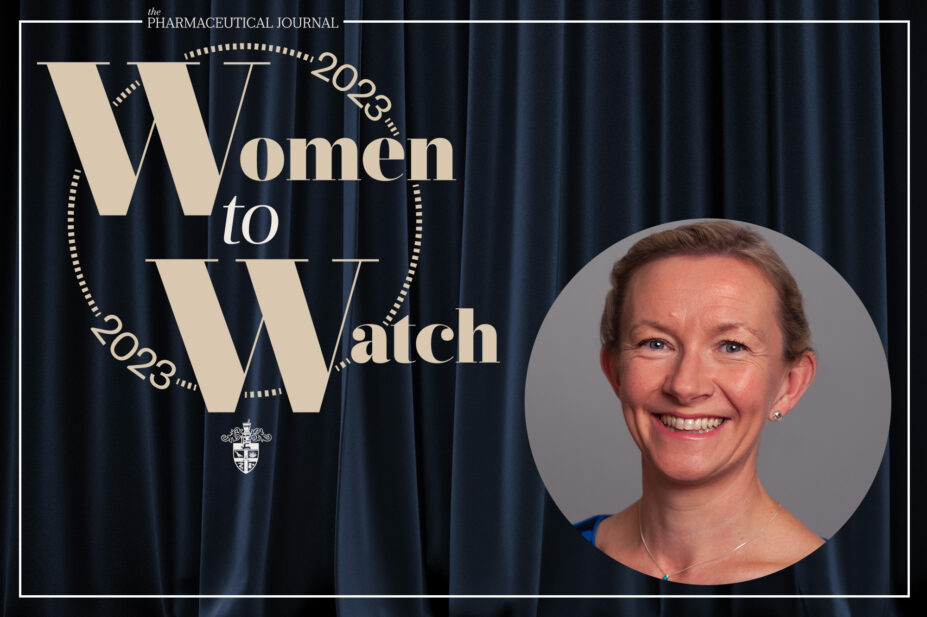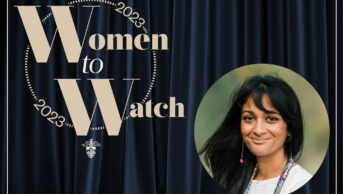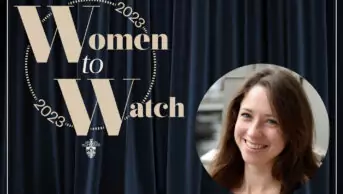
Elaine Ferguson/The Pharmaceutical Journal
In her research developing natural biodegradable polymers for better drug delivery, Elaine Ferguson has worked with chemists and engineers, clinicians and pharmaceutical companies. Describing herself as a truly “interdisciplinary researcher”, she may also be the only academic pharmacist to be based in a school of dentistry.
Having attracted almost £3m in research funding during her career at Cardiff University since 2008, where she is reader in polymer therapeutics, Ferguson has developed novel carriers that have been applied to drug delivery for cancer, infection, chronic wounds, spinal cord injuries and osteoarthritis, to name but a few. For the past two years, Ferguson has also been director of research at the university, tasked with developing its new research strategy.
Ferguson always had a keen interest in scientific research and a fascination with how drugs work in the body. She credits this as the reason why she did a pharmacy degree at Manchester University in the first place, completing six months of her preregistration year at AstraZeneca.
Following the completion of her pharmacy degree, Ferguson’s PhD looked at nanomedicine and drug delivery in breast cancer, which led to a postdoctoral research scientist position at Cardiff University in a research team investigating a growth factor delivery system to treat chronic wounds. Yet it was her work with polymers for antibiotic drug delivery that really kickstarted her career, leading to three patents for using alginate technology and an ongoing collaboration with AlgiPharma on the use of marine algae to develop drug delivery systems.
It’s a question of whether we can use our drug delivery systems to make it more patient specific and individualised
“At the time that was quite a new area of research but now it’s something that has been taken up more widely. It was the first time I’d done something that might lead to a commercial benefit,” she says.
Her most recent project centres around circadian rhythms, which she had been fascinated by when learning about them as an undergraduate student. “We’re trying to use those circadian rhythms as triggers for drug release and looking at how they affect drug delivery systems,” she explains.
People are starting to understand more about how time of day may impact the drugs administered to a patient, but what Ferguson is particularly interested in is how individual that effect is to each patient.
“[It’s a question of] whether we can use our drug delivery systems to make it more patient specific and individualised, rather than just telling everybody to take this statin at this time of night,” she says.
Working in academic research, Ferguson says she feels lucky to have a permanent post and is keen to pay that forward by being actively involved in the training, development and mentoring of pharmaceutical scientists, including several PhD students. She has put together a development package for early-career researchers including career development seminars, a Microsoft Teams space to support training and a quarterly postgraduate research student and staff committee meeting.
Her keenness to pay it forward has also resulted in work to encourage schoolchildren from deprived backgrounds into STEM careers. Working with the Nuffield Foundation, she has offered work experience opportunities in her laboratory to improve their CV and encourage them to think about working in research. “That had to stop in the [COVID-19] pandemic but we’re getting back into it now.”
Of particular importance to Ferguson is getting a good work-life balance and helping others to do the same, providing pastoral support to staff and students. “I’m dignity and wellbeing contact in the school. There is a lot of life juggling that goes on with having young children and my second, he was seven months old, when I returned to work a week into the COVID-19 pandemic. I felt like I didn’t have anybody checking in and saying, are you OK?”
She realised there needed to be a formal process in place to support those coming back to work after maternity leave or long-term illness “to make sure that they’re not just left on their own” so she did just that — assigning them a colleague who can check in with them.
Ferguson has two young children aged four and six years, but in her spare time has been known to take part in triathlons. As one of our judges put it, “she must never sleep”.
Cycling and running to work is what helps Ferguson’s own wellbeing, so she has set up a map of walking routes near work that people might like to follow in their lunchtime for a break and some exercise.
Overall, it is the variety in her role that she loves. “I collaborate with dentists, plastic surgeons, consultant rheumatologists and I am based on a hospital site, we have all these clinical connections. We’re also setting up this patient group so that we can talk about our research and try to understand what the patient wants.”
“Sometimes I think have I gone far away from pharmacy but really that’s where the profession is, we sit between everything,” she says.
Panel comments
“Elaine clearly has a huge impact supporting both students and colleagues, and creating links between the dentistry and pharmacy professions.”
“Elaine has collected two remarkable nominations from her colleagues, showcasing her outstanding contributions to the pharmacy field. With a diverse background spanning community, hospital and industry settings, she possesses a wealth of experience that sets her apart.”
- Meet the rest of The Pharmaceutical Journal’s Women to Watch 2023 here


